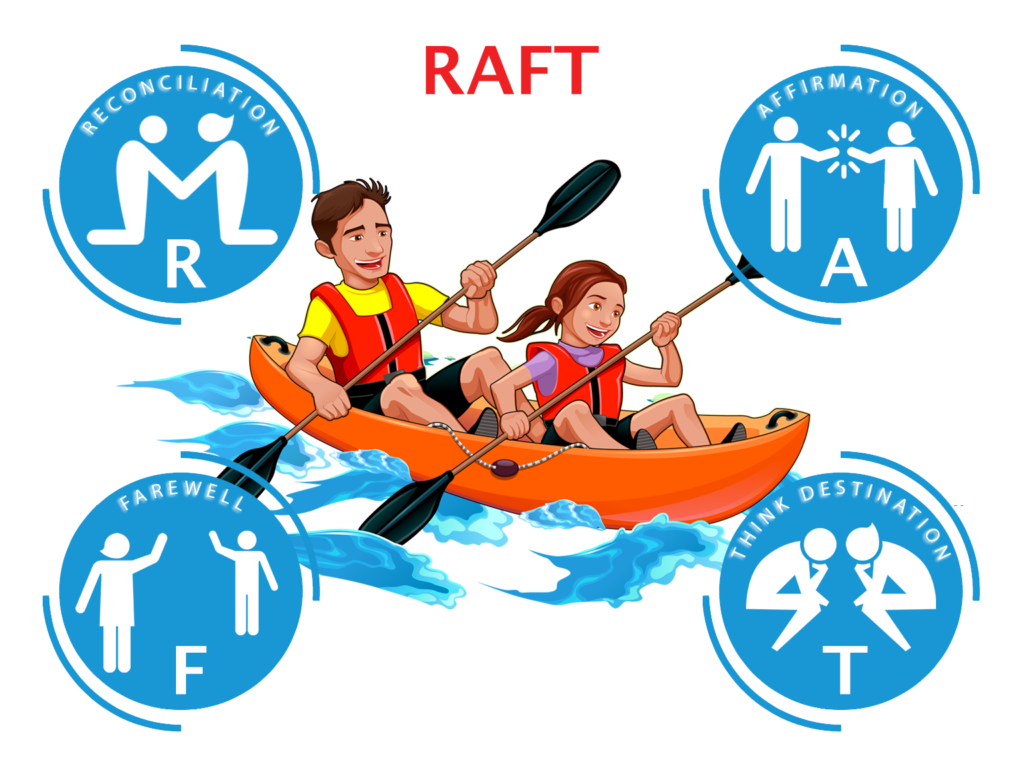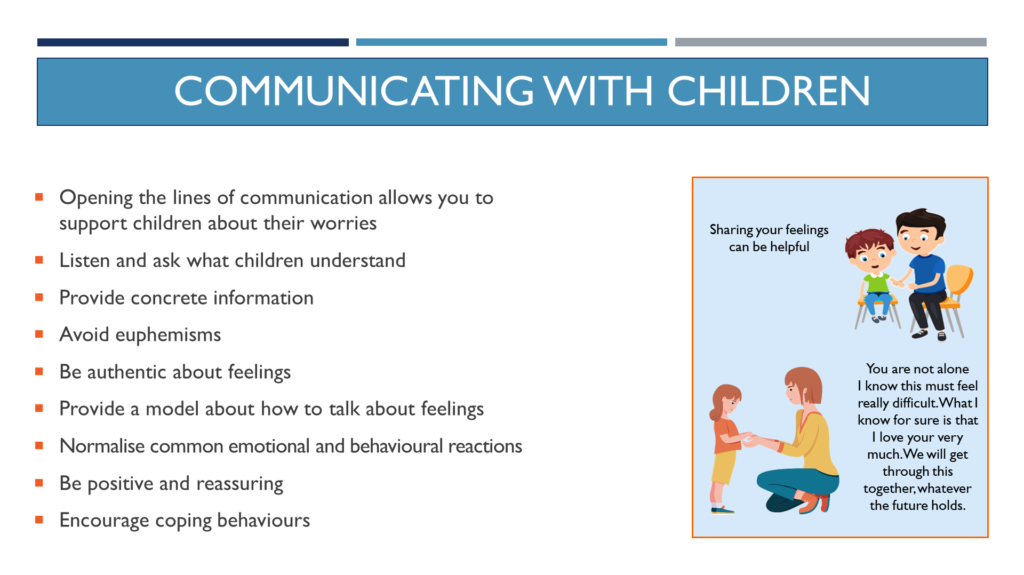Toolkit 1
Preparation
Looking Back and Looking Ahead
The aim of Toolkit 1 is to help you prepare before you move. Experience shows that during preparation and planning it is very important to pay attention to both the practical and the emotional aspects of moving, for the well-being of the whole family.
Good preparation involves simultaneously looking back and looking ahead. Saying goodbye to people and places, and planning and learning about the new location, are equally important aspects of moving. Sometimes we avoid the goodbyes because they may be too painful, but those who do so are often those who face the greatest struggles later.
The good life?
Maud was thrilled when her husband told her they were moving to Washington DC. She thought she knew all about life in America from the movies. She was happy that her children would get a good education, and didn’t foresee any difficulties. Everyone was excited for her, telling her she was moving to “the good life”. Her husband went ahead of the family to take up his new job, and she was so busy packing that she couldn’t accept many farewell party invitations.
Suddenly she found herself alone in an American apartment. It seemed that her husband was always working, he was often away, and the children were gone all day. She had never spent her days alone before. She was used to having lots of people and noise around, and had always had help in the house. It was hard to shop, clean and cook all by herself, and she was nervous about driving in America. Ordering food to be delivered and shopping online was easier, but she felt bad about how much she was spending.
She didn’t even think the children were getting a good education; it seemed to be all play and no work in that school. Feeling very low, she spent a lot of time thinking of home, and resorted to watching daytime TV. She had no energy and often fell asleep during the day, but couldn’t sleep at night. She wished she’d asked more questions about life in the U.S. before coming.
A Traumatized Teenager
When my husband joined the WBG we moved to Washington, DC and made a new home there with our three children. For three years he traveled for weeks at a time to Africa, and his manager started talking about relocating him to one of the countries in the region. We decided not to tell the children as there was so much uncertainty. The decision was finally made when we were on home leave: we were moving to Tanzania in one month.
Our thirteen-year-old daughter went hysterical when we told her. She locked herself in her room and cried for hours. Her cousins were calling through the door about how lucky she would be to go on safari trips. We returned to DC, packed up, took our son to start his freshman year at college, and flew out. There was no time for a pre-assignment visit or for long goodbyes. For several months our daughter hated her new school and begged us to send her to boarding school.
Eventually, she loved Tanzania and she retains a firm connection with the country. She strongly identifies with African music and art, and compares all beaches with Zanzibar. Yet, after fifteen years, she still resents that we didn’t discuss the move with her in advance and that it came as a shock to her. It has taken years for us to understand that trying to protect her only made things worse. Now we realize that involving her from the beginning could have made her transition easier and avoided long-term negative effects.
The time before moving is a roller coaster for most families. The process of getting ready, packing, being in transit, and then unpacking and settling in can be daunting. It is usual to feel both excited and sad at the same time. Different family members can have different responses to the process of relocation. Resentment or arguments can be disturbing and time-consuming.
There are usually more things to do than anticipated, and that creates anxiety about coping with the demands. Nerves get frayed. It can be difficult to find the time and energy to envisage your new day-to-day life, or to deal with the emotional aspects of moving, but they are both crucial aspects of leaving well.
Dr. David Pollock, an American sociologist and co-author of Third Culture Kids: Growing Up Among Worlds, stressed the importance of “leaving well to enter well.” He recommended building a RAFT. This applies to all members of the family, even very young preschool children.


RECONCILIATION
Resolve any existing conflicts. This is especially important for children, to learn that they cannot just leave and avoid the teacher they dislike or a friend that they fell out with. The unfinished business will travel with them. This also applies to adults. If there are relationships which need closure before you leave, take this opportunity to do so.

Affirmation
It is important to affirm special relationships and acknowledge relationships that matter to you; for example, writing thank you notes to special people, such as teachers and friends who have made an impact on your life.

Farewell
Saying goodbye to people, places, pets and possessions keeps us from having regrets later on. The goodbyes themselves also create special memories. If it is not possible to say goodbye physically, technology can be used in creative ways to facilitate goodbye rituals.

Think destination:
In the midst of our farewells, we also need to start thinking about where we are going to next. Moving to a new location can trigger feelings of uncertainty, even in the most seasoned of travelers. Having accurate information about the place you are moving to will make your expectations more realistic, and help you eliminate some anxiety and frustration.
Good endings facilitate new beginnings. Relocation entails multiple losses and it is necessary to acknowledge these before we are able to move forward. Saying goodbye to people and places can help us to feel and express our sadness about leaving. At the same time, the process can concretize happy memories. (See Strategies and Tips for some suggestions to help)
Generally, the relocation of a WBG family is related to the career of one family member. It can help if all family members understand why the move is happening. This means taking the time to explain how the work of the staff member will make a difference in the new country.
To avoid long-term repercussions, it can be helpful to discuss and acknowledge the pros and cons of the move for each family member and for the family as a whole. Family members who don’t want to move need to have the opportunity to express their feelings and perspectives. It is important to help them find the language to speak about how they are feeling. The best you can do for them is to acknowledge the way they feel and to show empathy. At the same time, be honest about your own feelings.
The information below is based on work by Professor Alan Stein, Head of Child and Adolescent Psychiatry at Oxford University, on how to talk with children about difficult topics. It makes useful points that are relevant to talking with children and teens about a forthcoming relocation. (Reproduced with permission)

Communicating with children


Listen and ask what children understand
- Opening the lines of communication allows you to support children about their worries
- Provide concrete information
- Avoid euphemisms
- Be authentic about feelings
- Provide a model about how to talk about feelings
- Normalise common emotional and behavioural reactions
- Be positive and reassuring
- Encourage coping behaviours
Moving from one country to another can be a more positive experience, in both the short and long term, if all family members are involved in the preparation. The move will be easier if each family member feels that he or she has been listened to in the process. It is also important to find ways to give children some sense of autonomy, in what feels like a choiceless situation.
The suggestions given below are intended to stimulate your thinking and to give you some ideas. We hope that they will help you and your family, though individuals and situations are different and cultural norms vary.
- Mark your departure: Leave-taking rituals can help to provide closure. These might be farewell parties, compiling memory books and photograph albums, or your own creative ideas. Even if you plan to keep in touch with people in the future, this is still the ending of an era and needs to be marked as such.
- Make farewell visits: If time allows, it can be helpful to pay farewell visits to places that were special to the family, such as favorite parks or restaurants, and remember the good times there.
- Give some control: Allow all family members some decisions they can be in control of; for example, packing their own box of favorite things to remind them of special places and people. Let children participate in the disposing of toys and other items. They might choose to give them to friends or donate them to a charity.
- Include everyone: Involve all family members in making difficult choices about what needs to be discarded or stored. It can be very upsetting for children to discover later that treasured possessions have not been brought along. If you have to leave pets behind, try to involve all family members in the re-housing. This is more time-consuming, but can help children manage their feelings of loss.
- Carry familiar objects: Carry a few items, photographs, and favorite family games with you in your luggage. They will help you establish a sense of continuity and familiarity in the new place, while waiting for your shipment to arrive.
- Use checklists: These can help you keep track of the many tasks to be done before departure. Some suggestions to get you started are in the Delving Deeper section of this toolkit.
- Plan ahead for work: If you have a job that you are reluctant to leave, discuss with your employer the possibilities of working remotely. You can also try applying for a job in the new country before you move, such as with an international organisation. Accepting a job offer in advance might mean applying for your own working visa, rather than as an accompanying spouse.
- Consult the GMS portal: For this your WBG staff member partner will have to register you with the WBG Global Mobility Services (GMS). The portal has information about the relocation process and benefits, and country specific information on issues such as health, security, housing, schools, spouse support and employment, etc.
- Read the briefing material: GMS will also usually provide the staff member with information about the relocation. Reading this thoroughly before departure can answer a lot of questions. Make sure you understand what support will be provided by the Relocation Focal Point in the Country Office and by the destination relocation service provider. The HR Global Mobility Analyst will be able to answer these questions.
- Contact WBG Family Network: For most locations we can put you in touch with a local member who can give you inside information on life there. You can also find information on many duty stations in the WBG Family Network website; this is a work in progress, and you might want to contribute information on your new, or old, location.
- Connect with the school: If you can, make contact with a parent at the new school. As well as looking at the school website, try to get the school newsletter or updates before your move. This can help you and your children engage with the new community and have realistic expectations of the school.
- Do your research: Encourage all family members to do their own research about the new location, and share what you learn with each other. The checklists in the Delving Deeper section include some suggested questions to guide your research.
- Carry documents: Take care that personal documentation you might need for departure, or on arrival, is not inadvertently packed in the shipment. This includes school and health records, visa support documentation, your shipment inventory, etc.
- Be flexible: Try to anticipate any difficulties you may come up against, so that you can seek relevant information. On the other hand, be aware that it is impossible to anticipate everything and there are some questions you can’t even imagine before you go. Being flexible will help you settle in.
- Benefit from the trip: If you are offered a pre-assignment trip, it is worth making time for it. This can help you to have realistic expectations, and can put the practical aspects of moving into motion. For example, you can view rental properties, visit the schools, find out where to go shopping, etc.
- Meet WBG families: Before the pre-assignment visit ask the WBG Family Network, or the Country Office Relocation Focal Point, to introduce you to other WBG families you can meet during your visit. You can ask questions and learn from their experience, and have some familiar faces for when you move.
- Consider taking the children: Consider taking your children with you on the pre-assignment trip, particularly if you have teenagers who are reluctant to move. This will give them a glimpse into what life could be like for them once you relocate. Though their trip would be at your own expense, the benefits could be worth it. Some WBG Family Network families have found this beneficial.
- Share with the family: If your family does not go with you on the pre-assignment visit, use technology to show them as much as you can while you are there. On your return, take the time to try to answer all their questions, however busy you are.

Build your RAFT (Reconciliation, Affirmation, Farewells, Think destination); take time for looking back as well as looking forward
Involve all family members in the preparation and in decisions about packing, and acknowledge any different feelings about the relocation
Carry with you important documentation, and some familiar objects/games etc., to use until your shipment arrives
The following checklists are suggestions to help you think more deeply about your move. They can help ensure that, in all the upheaval, you don’t forget something important. Many of these points will depend on the country you are moving from/to, and your personal situation, and you can add to them or make your own lists as applicable.
Pre-departure Checklist
- Adequate notice to your landlord or agent, if you are renting
- Postal Service – arrange to have your post re-directed
- Utility companies, phone/internet services, TV cable/satellite
- Schools (private schools may require advance notice)
- Your doctor – if you are on long-term medication, get a supply to tide you over the initial settling-in period
- Your dentist
- Obtain copies of medical records for you and your family
- Clubs
- Your lawyer
- Appoint a power of attorney to act in your absence, if appropriate/required
- Discontinue any publications you subscribe to/or inform of change of address
- Make arrangements for ongoing expenses in your home country including instalment payment plans and accounts with stores
Personal Documentation
- Passports: make sure that everyone in the family has a valid travel document with more than 6 months left before expiration
- Visas: for the visa application process, check with the Relocation Focal Point if you are being posted to a country office, or HR Operations if relocating to the U.S., and allow enough time for possible delays
- Work permits (if applicable)
- International drivers’ licenses
- Birth, marriage certificates, divorce/custody papers if applicable
- Medical records for all the family, including immunization records
- School reports of children
- Degrees, diplomas, and professional certification
- Wills and relevant documents
- Correct documentation for any pets traveling with you, such as travel and inoculation papers, etc.
- A good supply of passport photos for ID cards, etc., when you arrive
Banking and Insurance
- Carry with you copies of the insurance forms for your shipment and for any items left in storage. Read the small print and make sure that you understand what kind of cover you have, especially for valuable antiques, works of art, etc.
- If you have other insurance policies (including endowments in respect of mortgage) advise the companies that you are moving, or cancel as appropriate.
- Inform your bank of your move. Some types of accounts do not permit an overseas address. Activate internet banking to manage accounts online.
- Make arrangements for ongoing expenses in your home country.
- Do not discontinue home country credit cards if you are concerned about losing your credit rating.
- Get copies of your car insurance records for the last five years. This might help you establish creditworthiness in the host country.
Thinking Destination
- What is unique and special about the country?
- What exciting travel and learning opportunities does the country offer?
- Customs, manners and culture of the country
- Salary/relocation package and benefits
- Employment/volunteering opportunities, work permits and tax considerations if you intend to work as an accompanying partner
- Security and safety
- Schooling
- Medical care and insurance coverage
- Housing options
- Possibility of power cuts/water shortages and how to manage them
- Driving laws and getting a local driving license
- How good is the internet connection?
- Languages used and opportunities for language instruction
- Information about pets – need for quarantine, etc.
- What do I need to bring for my family to be comfortable?
- Availability of medication locally, if on long-term medication
- Add your personal “must haves” to the list
- Add your personal “must haves” to the list
Your Personal Transition
These questions are suggestions to help you, the accompanying partner, to prepare yourself mentally for the move. You might not be able to get answers to them all before moving, but being aware of them can help you focus on what to ask other WBG spouses when you get the chance.
- What does this place have to offer me?
- How will I find a new support system?
- What am I going to miss?
- How will I get around?
- How will I make time for myself?
- What will I/we do for relaxation and enjoyment?
- How will I find the best shops, get my hair cut, or go to the gym?
- How will I manage when my partner is away on mission?
- What can I bring to this new situation?
